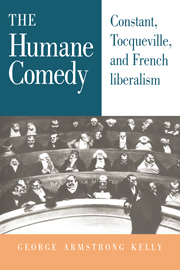Foreword: Stephen R. Graubard
Published online by Cambridge University Press: 31 March 2010
Summary
The premature and untimely death of an active and engaged scholar is always tragic. In the case of the late Professor George Armstrong Kelly, the tragedy is compounded by his not having witnessed what so few imagined even possible at the time of his death in December 1987 – the sudden and complete collapse of many of the principal Communist regimes of Central and Eastern Europe, and the growth of a new interest in liberal institutions and values. How one wishes that the author of this work had lived to see these events, to comment on them, to place them in a historical frame, to explain why Tocqueville and any number of other nineteenth-century French liberals are again in fashion, not so much with the politicians of our day as with those who are scholars, committed to seeing how the past lives on in the present.
George Kelly had many distinctions – not the least being his capacity to “trespass” intellectually on many fields, ignoring many of the conventional disciplinary boundaries, making each of the ones he entered his own, without ever appearing to be aggressive or aggrandizing. His interests were legion, his capacities for empathy and understanding so wide-ranging that it seemed as natural for him to be concerned with Hegel as with the French twentieth-century colonial imbroglio in Algeria, with the problems of the American university as with the more cosmic issues raised by the French Revolution, with religious and political consciousness in the United States as with what he chose to call “mortal politics” in eighteenth century France.
- Type
- Chapter
- Information
- The Humane ComedyConstant, Tocqueville, and French Liberalism, pp. ix - xiiiPublisher: Cambridge University PressPrint publication year: 1992



